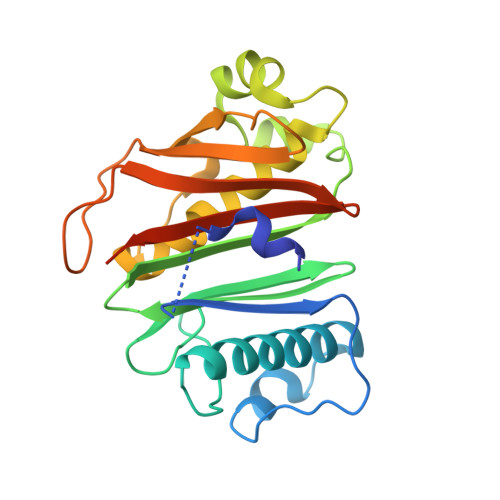In Vitro and In Vivo Inhibition of the Mycobacterium tuberculosis Phosphopantetheinyl Transferase PptT by Amidinoureas.
Ottavi, S., Scarry, S.M., Mosior, J., Ling, Y., Roberts, J., Singh, A., Zhang, D., Goullieux, L., Roubert, C., Bacque, E., Lagiakos, H.R., Vendome, J., Moraca, F., Li, K., Perkowski, A.J., Ramesh, R., Bowler, M.M., Tracy, W., Feher, V.A., Sacchettini, J.C., Gold, B.S., Nathan, C.F., Aube, J.(2022) J Med Chem 65: 1996-2022
- PubMed: 35044775
- DOI: https://doi.org/10.1021/acs.jmedchem.1c01565
- Primary Citation of Related Structures:
7N8E, 7N8L, 7N8M - PubMed Abstract:
A newly validated target for tuberculosis treatment is phosphopantetheinyl transferase, an essential enzyme that plays a critical role in the biosynthesis of cellular lipids and virulence factors in Mycobacterium tuberculosis . The structure-activity relationships of a recently disclosed inhibitor, amidinourea (AU) 8918 ( 1 ), were explored, focusing on the biochemical potency, determination of whole-cell on-target activity for active compounds, and profiling of selective active congeners. These studies show that the AU moiety in AU 8918 is largely optimized and that potency enhancements are obtained in analogues containing a para-substituted aromatic ring. Preliminary data reveal that while some analogues, including 1 , have demonstrated cardiotoxicity (e.g., changes in cardiomyocyte beat rate, amplitude, and peak width) and inhibit Ca v 1.2 and Na v 1.5 ion channels (although not hERG channels), inhibition of the ion channels is largely diminished for some of the para-substituted analogues, such as 5k ( p -benzamide) and 5n ( p -phenylsulfonamide).
Organizational Affiliation:
Division of Chemical Biology and Medicinal Chemistry, UNC Eshelman School of Pharmacy, University of North Carolina at Chapel Hill, Chapel Hill, North Carolina 27599, United States.



















